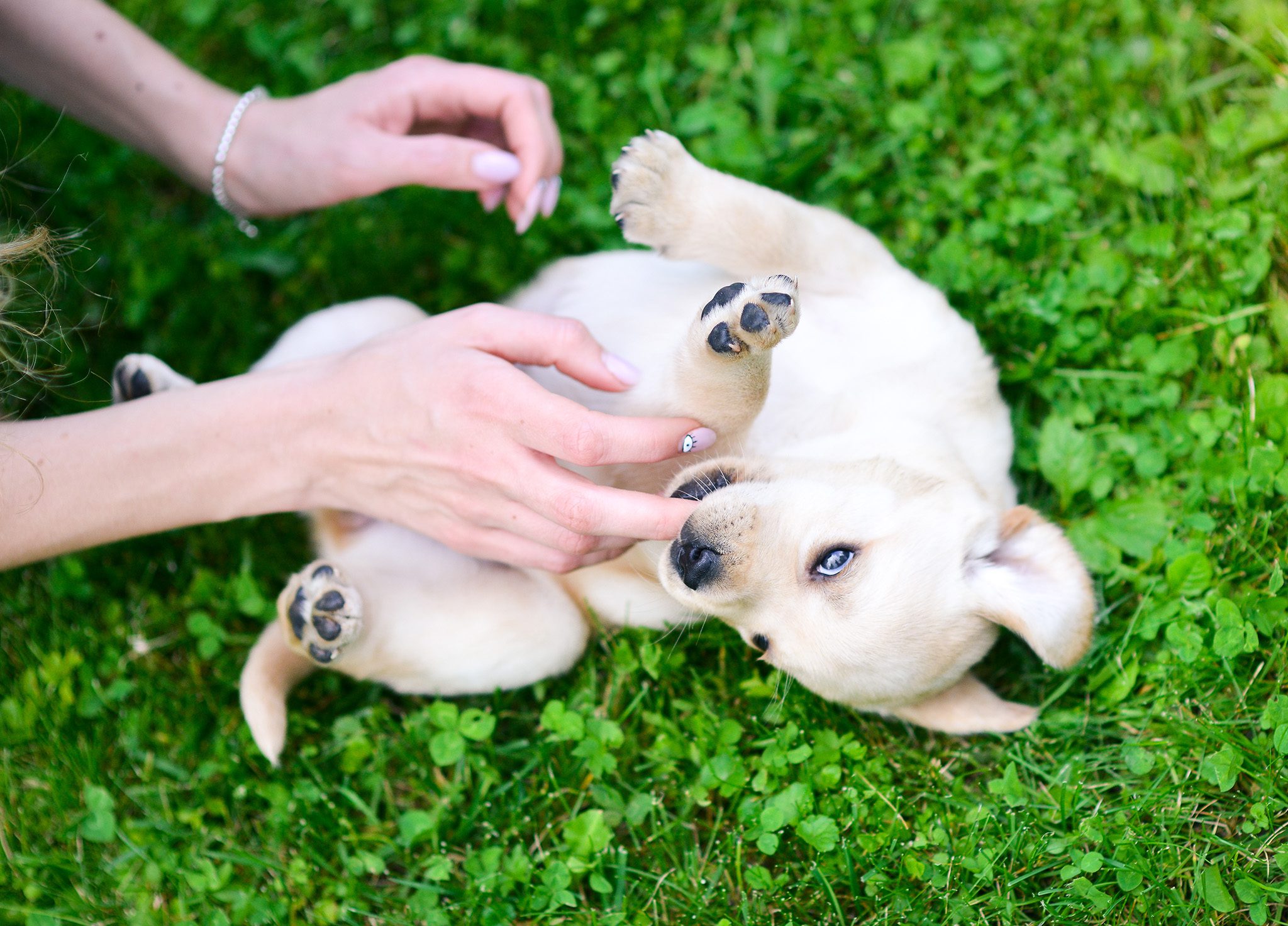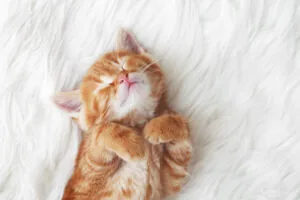Puppy Nipping and Mouthing

Puppies spend a great deal of time playing, chewing, and investigating objects. All of these normal activities involve puppies using their mouths and their needle-sharp teeth. When puppies play with people, they often bite, chew and mouth on people’s hands, limbs, and clothing. This kind of behavior may seem cute when your pet is seven weeks old, but it’s not nearly as endearing when they are three or four months old– and getting bigger by the day!
What to Do About Puppy Mouthing
It is important to help your pet learn to curb their mouthy behavior. There are various ways, some better than others, to teach this lesson. The ultimate goal is to train your pet to stop mouthing and biting people altogether. However, the first and most important objective is to teach them that people have very sensitive skin, so they must be gentle when using their mouth.
Bite Inhibition: Teach your Pet to be Gentle
Bite Inhibition refers to a dog’s ability to control the force of their mouthing. A puppy or dog who hasn’t learned bite inhibition with people doesn’t recognize the sensitivity of human skin, and so they bite too hard, even in play. Some behaviorists and trainers believe that a dog who has learned to use their mouth gently when interacting with people will be less likely to bite hard and break skin if he ever bites someone in a situation apart from play–like when they are afraid or in pain.
Puppies usually learn bite inhibition during play with our puppies. If you watch a group of puppies playing, you’ll see plenty of chasing, pouncing, and wrestling. Puppies also bite each other all over. Every now and then, a pup will bite their playmate too hard. The victim of the painful bite yelps and usually stops playing. The offender is often taken back by the yelp and also stops playing for a moment. However, pretty soon, both playmates are back in the game. Through this kind of interaction, puppies learn to control the intensity of their bites so that no one gets hurt and the play can continue without interruption. If puppies can learn how to be gentle from each other, they can also learn the same lesson with people.
What to Do Next: Teach your Puppy That Teeth Don’t Belong on Skin
- Substitute a toy or chew bone when your puppy tries to gnaw on fingers or toes
- Puppies often mouth on people’s hands when stroked, patted and scratched (unless they’re sleepy or distracted). If your puppy gets all riled up when you pet them, distract them by feeding them small treats from your other hand. This will help your puppy get used to being touched without mouthing.
- Encourage non-contact forms of play, such as fetch and tug-of-war, rather than wrestling and rough play with your hands.
- If your puppy bites at your feet and ankles, carry their favorite tug toy in your pocket. Whenever he ambushes you, instantly stop moving your feet. Take out the tug toy and wave it enticingly. When your puppy grabs the toy, start moving again. If you don’t happen to have a toy available, just freeze and wait for the puppy to stop mouthing you. The second they stop, praise and get a toy to reward them. Repeat these steps until your puppy gets used to watching you move around without going after your feet or ankles.
- Provide plenty of interesting and new toys so that your puppy will play with them instead of gnawing on you or your clothing.
- Provide plenty of opportunities for your puppy to play with other puppies and with friendly, vaccinated adult dogs. Playing and socializing with dog buddies is important for your puppy’s development–and if they expend a lot of their energy playing with other puppies, they’ll feel less motivated to play with you. Consider enrolling your puppy in a good puppy class, where they can have supervised playtime with other puppies and learn some important new skills!
- Use a time-out procedure, just like the one described above–but change the rules a little. Instead of giving your puppy time-outs for hard biting, start to give him time-outs every time you feel their teeth touch your skin.
- The instant you feel your puppy’s teeth touch you, give a high-pitched yelp. Then immediately walk away from them. Ignore them for 30-60 seconds. If your puppy follows you or continues to bite and nip at you, leave the room for 30-60 seconds. After the brief time-out, return to the room and calmly resume whatever you were doing with your puppy.
- If a time-out isn’t viable or effective, consider using a taste deterrent, such as Bitter Apple Spray. Spray areas of your body or clothing that your puppy likes to mouth before you start interacting with them. If they mouth or bite you, stop moving and wait until they taste the deterrent. Praise them when they let you go. Apply the deterrent for at least two weeks. After the two weeks of being punished by the bitter taste every time they mouth you, your puppy will learn to inhibit their mouthy behavior.
- Be patient and understanding. Playful mouthing is normal behavior for a puppy or young dog.
Because mouthing issues can be challenging to work with, don’t hesitate to enlist in the help of a certified dog trainer. A trainer can offer group or private classes that can give you and your puppy lots of assistance with mouthing.
Share This Post
Recent Posts
About Shallowford Animal Hospital
Shallowford Animal Hospital and The Pet Spa at Shallowford are dedicated to the exceptional, compassionate care your pet deserves. Pets hold a very special place in our families, and we treat yours like our own.



